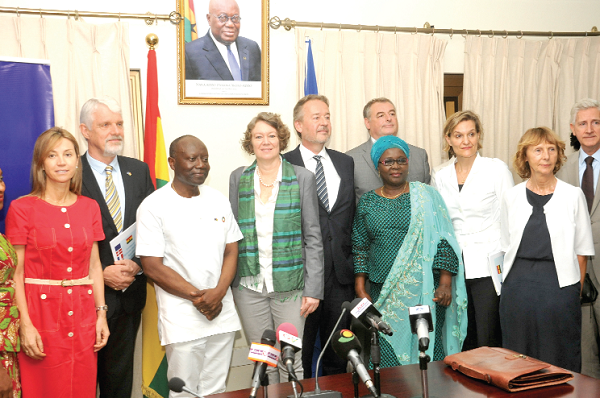Ghana and the European Union have signed four new financing agreements that will allow the union and its partners to support the country’s development agenda with a grant of £175 million.
The money is to be used to support four programmes that the EU, a group of 28 countries, and the government have been working at improving.
The programmes are agriculture enhancement with special focus on the savannah zone, decentralisation, resilience against climate change and public financial management (PFM) and the economic partnership agreements (EPAs).
Commendation
The Minister of Finance, Mr Ken Ofori-Atta, at the signing ceremony in Accra on Tuesday, expressed the government’s gratitude to the EU for its continuous support for the country’s development agenda.
He said the latest support was timely, given that it came at a time the government had also prioritised the four areas that the grant would support, for the purpose of job creation and better service delivery.
“The policies and programmes in the 2018 budget statement further reiterate government’s commitment to improve agricultural production and position it as the main driver of economic transformation,” he said.
Govt’s issues
Mr Ofori-Atta, however, explained that the government “had some issues with the way we programme donor aids.”
“For example, of the £175 million that you are giving us, about 30 per cent – £53 million – will be directly managed by the government of Ghana under its public financial management system. The rest, £122 million, will be managed by EU development agencies of EU member states.”
In its current state, the minister said, the disbursement arrangement “undermines, in a certain degree, the efforts to be in control of our own public financial resources. In line with our vision of a Ghana Beyond Aid, we don’t only need to have the resources that are relevant to our programmes but also managing it because we have the capacity to do that,” he said.

Potential savings
Under the PFM, the EU’s support is expected to help build the capacities of oversight bodies such as the Ghana Audit Service, Internal Audit Service, the Procurement Authority and Parliament, in line with efforts to deepen public accountability and ethics.
Mr Ofori-Atta said that was critical for the country.
He was particularly appreciative of the impact that the financial support would have on the operations of the Audit Service, given that its activities have so far led to some savings for the country.
After examining claims worth about GH¢11 billion, Mr Ofori-Atta said only 52 per cent were validated. This translates into potential savings of about GH¢5.4 billion. He explained that the EU support “could lead to multiple savings in excess of the grant amount.”
He also emphasised government’s commitment to decentralisation and pledged to help ensure that the funds would be properly disbursed and utilised for their intended purposes.
EU Ambassador
The EU Ambassador to Ghana, Mr William Hanna, said in recent years, the union had focused on improving upon its strategic political relations with Ghana in a manner that would redirect attention from aid to trade and investment.
He added that the union was in support of the government’s commitment to a Ghana Beyond Aid, “given that it does not come out of the blue.”
“It is part of a long-term effort to improve the way we work together and here in Accra today, we see a new determination to take the lead and set the agenda,” he said.
Mr Hanna said he was impressed that aid as a percentage of the country’s national income had been on the decline, dropping from about 16 per cent in 2004 to 2.2 per cent in 2013.
That, he said, was due to the positive changes in the country’s income status and “the change in view on our side that we should call for new ways of doing things, innovative financing and increased role for the private sector.”
The Minister of Local Government and Rural Development, Hajia Alima Mahama and other heads of government agencies were present at the ceremony.
Source: Graphic Online


Comments are closed.